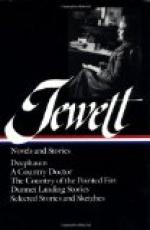“What a pitiful ending it is,” said Kate. “Do you realize that the family is broken up, and the children are to be half strangers to each other? Did you not notice that they seemed very fond of each other when we saw them in the summer? There was not half the roughness and apparent carelessness of one another which one so often sees in the country. Theirs was such a little world; one can understand how, when the man’s wife died, he was bewildered and discouraged, utterly at a loss. The thoughts of winter, and of the little children, and of the struggles he had already come through against poverty and disappointment were terrible thoughts; and like a boat adrift at sea, the waves of his misery brought him in against the rocks, and his simple life was wrecked.”
“I suppose his grandest hopes and wishes would have been realized in a good farm and a thousand or two dollars in safe keeping,” said I. “Do you remember that merry little song in ‘As You Like It’?
’Who doth ambition shun
And loves to live i’
the sun,
Seeking the food
he eats,
And pleased with
what he gets’;
and
’Here shall
he see
No
enemy
But winter and rough weather.’
That is all he lived for, his literal daily bread. I suppose what would be prosperity to him would be miserably insufficient for some other people. I wonder how we can help being conscious, in the midst of our comforts and pleasures, of the lives which are being starved to death in more ways than one.”
“I suppose one thinks more about these things as one grows older,” said Kate, thoughtfully. “How seldom life in this world seems to be a success! Among rich or poor only here and there one touches satisfaction, though the one who seems to have made an utter failure may really be the greatest conqueror. And, Helen, I find that I understand better and better how unsatisfactory, how purposeless and disastrous, any life must be which is not a Christian life! It is like being always in the dark, and wandering one knows not where, if one is not learning more and more what it is to have a friendship with God.”
By the middle of the afternoon the sky had grown cloudy, and a wind seemed to be coming in off the sea, and we unwillingly decided that we must go home. We supposed that the funeral would be all over with, but found we had been mistaken when we reached the cove. We seated ourselves on a rock near the water; just beside us was the old boat, with its killick and painter stretched ashore, where its owner had left it.
There were several men standing around the door of the house, looking solemn and important, and by and by one of them came over to us, and we found out a little more of the sad story. We liked this man, there was so much pity in his face and voice. “He was a real willin’, honest man, Andrew was,” said our new friend, “but he used to be sickly, and seemed to have no luck, though for




